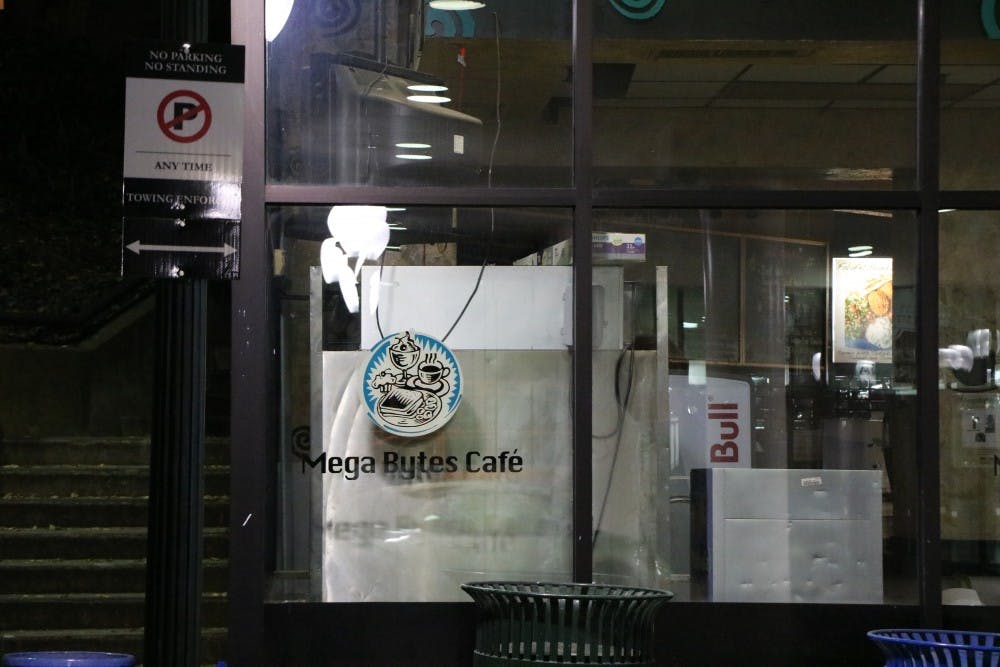The owner of the Megabytes Cafe has filed a lawsuit against American University over access to his business and losses in revenue over the past three months while the restaurant was closed.
Tom Gera, the owner of Megabytes, Mudbox, American Cafe and Argo Tea, filed a lawsuit against the University on Dec. 6 after he said the restaurant’s locks were “illegally” changed without his consent.
In October, two videos of rats digging through food in Megabytes went viral among AU students on social media. Shortly afterward, the University issued a statement that said Megabytes would close on Nov. 1, and would not reopen until the University had “sufficient time to develop a remediation plan.”
Gera is asking a judge to award him $1,436,350 for the revenue he has lost from a result of the restaurant’s closure as well as for the inventory and appliances that are still in the facility, which is located in the Bender tunnel. According to the lawsuit, Gera estimates that he has lost and will lose about $1,338,000 in revenue due to the closure.
Gera said in an interview he did not want Megabytes to close because it passed the D.C. city health inspection that month. Though the videos of rats were taken before the city’s health inspection, the inspector did not see rodents on their visit.
When he arrived to open Megabytes on Nov. 2, Gera said the locks had been changed without him knowing and he could not get in.
“I don’t think [the University] has more jurisdiction than the health department,” he said.
Gera still hasn’t been able to enter Megabytes since the spring semester began. He said he doesn’t know what happened to the food, equipment and money that was inside the restaurant when it closed.
AU’s Auxiliary Services department, which handles campus dining, mail and supplies, is planning on making big changes to Megabytes that will take months to complete, Gera said. Even though he still pays rent for Megabytes, he said he is unaware of what the changes will be.
“I believe the University wants to get rid of small businesses,” Gera said. “I have no faith in Auxiliary Services.”
Chuck Smith, the executive director of Auxiliary Services, referred The Eagle to Mark Story, a university spokesperson, when reached for comment. Story said it is university policy not to comment on “pending litigation.”
Discussions on who will pay for renovations to fix the cafe’s rodent issue will “play out in court,” Gera said.
After the cafe closed, some Megabytes employees were moved to other on-campus restaurants, while four other employees were laid off, Gera said. He said his biggest concerns are for his employees and students who are suffering the loss of a campus dining staple.
“Our quality and food service is better than a corporation,” he said, referring to Aramark, the University’s central dining provider.
Gera’s lawsuit also addresses the loss of business he has experienced by the University not allowing students to use Dining Dollars at Megabytes.
Dining Dollars, which are included in AU meal plans, can now only be used at Aramark dining locations rather than all on-campus dining facilities. EagleBucks, which are slated for off-campus dining options, can be still be used to purchase items at Gera’s other businesses.
Gera’s lawsuit states that the University breached the lease that he signed in 2010. In the lawsuit, Gera’s lawyer, Christopher Markham of Gaithersburg, Maryland, argues that the University’s “behavior in the matter is replete with fraud, malice, ill will, recklessness, and a wanton and willful disregard” for Gera’s rights.
After working with AU for 15 years, Gera said he still wants to work with the University because he has great relationships with faculty and administrators. He said he wants to fight for his and his staff’s rights.
“I’m an immigrant, so I know you have to stand your ground,” he said.
Gera said Megabytes is not closed forever, but he doesn’t know when it will be open again.
“Every day, I had more than 500 customers coming to my shop,” Gera said. “The American University community is suffering because of illegal and irrational decisions by Auxiliary Services.”
Note: This article has been updated to reflect the contents of Gera's lawsuit. This article has also been changed to clarify that the D.C. city health inspector did not note rodents on their inspection of Megabytes.





